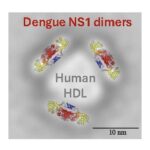Lien vers Pubmed [PMID] – 11825945
J. Clin. Microbiol. 2002 Feb;40(2):376-81
During flavivirus infection in vitro, nonstructural protein NS1 is released in a host-restricted fashion from infected mammalian cells but not vector-derived insect cells. In order to analyze the biological relevance of NS1 secretion in vivo, we developed a sensitive enzyme-linked immunosorbent assay (ELISA) to detect the protein in the sera of dengue virus-infected patients. The assay was based on serotype 1 NS1-specific mouse and rabbit polyclonal antibody preparations for antigen immunocapture and detection, respectively. With purified dengue virus type 1 NS1 as a protein standard, the sensitivity of our capture ELISA was less than 1 ng/ml. When a panel of patient sera was analyzed, the NS1 antigen was found circulating from the first day after the onset of fever up to day 9, once the clinical phase of the disease is over. The NS1 protein could be detected even when viral RNA was negative in reverse transcriptase-PCR or in the presence of immunoglobulin M antibodies. NS1 circulation levels varied among individuals during the course of the disease, ranging from several nanograms per milliliter to several micrograms per milliliter, and peaked in one case at 50 microg/ml of serum. Interestingly, NS1 concentrations did not differ significantly in serum specimens obtained from patients experiencing primary or secondary dengue virus infections. These findings indicate that NS1 protein detection may allow early diagnosis of infection. Furthermore, NS1 circulation in the bloodstream of patients during the clinical phase of the disease suggests a contribution of the nonstructural protein to dengue virus pathogenesis.


